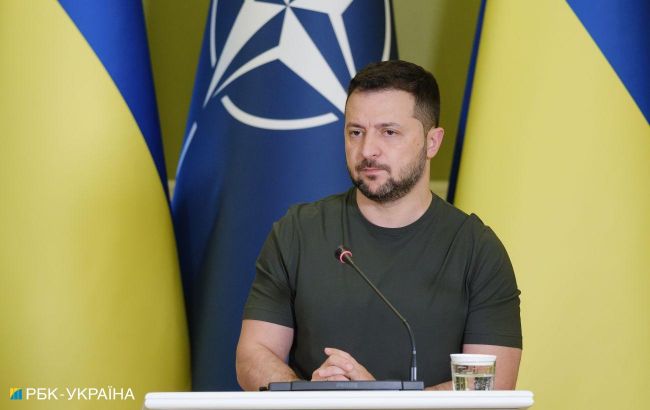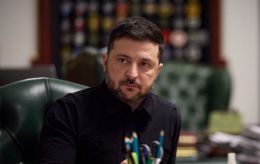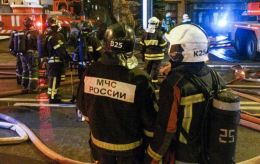Conflict between Zelenskyy and Zaluzhnyi: Ukrainian elections 'not on time'
 President Volodymyr Zelenskyy (photo: Vitalii Nosach, RBС-Ukraine)
President Volodymyr Zelenskyy (photo: Vitalii Nosach, RBС-Ukraine)
The government hesitated to schedule the presidential election for next spring due to technical and political risks, relations between Volodymyr Zelenskyy and Valerii Zaluzhnyi have soured, and next year will be more difficult for Ukraine due to problems in the West.
All these and more in the article by RBC-Ukraine titled "Political tensions caused by war and what will happen to West's help for Ukraine".
On elections
Three weeks ago, RBC-Ukraine's interlocutors in the government team began talking about the March 2024 presidential election with more certainty, as it seemed that the unofficial campaign had already been launched. The relevant Rada committee even prepared a bill on which territories it would be possible to hold voting. But after President Volodymyr Zelenskyy's address on November 6, in which he explicitly stated that it was inappropriate to hold elections now, this topic was removed from the agenda at least until next spring.
According to RBC-Ukraine, the president's team had different opinions on the election. If they were held in March, Zelenskyy would effectively guarantee himself a new presidential term, as he has no real competitors among politicians now.
But it is incredibly difficult to hold democratic elections in a time of war, mass migration of Ukrainians, anxiety, etc. In addition, the election campaign would sharply exacerbate all the current contradictions in Ukrainian society.
"In conclusion, all these arguments outweighed another argument, which is also voiced in the presidential team: the more time passes, the more difficult it will be for Zelenskyy to be re-elected (assuming the war does not end with a complete and uncompromising victory for Ukraine)," the article says.
About Zelenskyy and Zaluzhnyi
Commander-in-Chief Valeriy Zaluzhnyi's article in TIME about the war in Ukraine becoming a positional war provoked a sharp reaction from Bankova Street. According to RBC-Ukraine, the President's Office was aware that Zaluzhnyi intended to release such material, but did not know its content.
"Zaluzhnyi's statements triggered a sharp reaction at the Bankova (the street where the Ukrainian president's office is located). Deputy Head of the Office of the President Ihor Zhovkva harshly criticized them, and the Commander of the Joint Forces Viktor Khorenko suddenly lost his position, and according to RBC-Ukraine's information, Zaluzhnyi was not informed about it in advance. Some sources say that the key reason for this dismissal was an undisclosed conflict between the former commander of the Special Operations Forces and one of the deputy heads of the Office of the President, Roman Mashovets, responsible for the military direction in the OP," the RBC-Ukraine article reads.
Sources confirm that the relationship between Zelenskyy and Zaluzhnyi has deteriorated recently, though not as much as some Western media report.
"We see the situation, the demand for betrayal has arisen. They are looking for scapegoats. Relations between Zelenskyy and Zaluzhnyi have indeed cooled. But the thing is, they can coexist in this state for a long time - let's remember the example of Poroshenko and Groysman," says an RBC-Ukraine source in the presidential entourage.
The publication's interlocutors in the presidential party also believe that the political opposition, including Petro Poroshenko and his associates, is actively playing on the contradictions between the president and the chief of the military. Their task, according to the party, is to create maximum political subjectivity for Zaluzhnyi.
At the same time, according to all of RBC-Ukraine's sources in various political camps and structures, Zaluzhnyi has no plans to enter politics.
"The presidential team acknowledges that Zaluzhnyi is generally a good military leader, although certain problems in the army, such as with the Medical Forces, remain chronically unresolved (on the evening of November 19, Zelenskyy changed their leadership). But firing him now automatically gives him a significant starting bonus for a potential political career, in addition to his current popularity," the article states.
On Western assistance
Ukraine has recently been facing an unfavorable external environment: the crisis in the U.S. House of Representatives, the war in Gaza, and the elections in Slovakia. Although Kyiv cannot directly influence these processes, the foreign policy rhetoric must be adjusted.
In general, the approach that worked well last year – the unconventional, aggressive diplomacy (alongside positivity for the domestic Ukrainian audience) – is not effective anymore. For example, Germany was somewhat stirred by such methods last year, but Zelenskyy's sharp tone almost backfired at the NATO Summit in Vilnius this year.
A notable conclusion reached by RBC-Ukraine after discussions with European and American officials is that no one will stop assisting Ukraine throughout the following year. Although it will be more complicated than it is now, the main threat is the ongoing US presidential campaign and the prospect of Donald Trump's victory (although Kyiv has already begun to seek approaches to representatives of the Republican Party). In general, according to all of the interlocutors, 2024 will be a more difficult year for Ukraine than this year.
"Everything will remain as it is until spring, both inside the country, on the front, and in the West. We will repel shelling and monitor American policy, as it is currently more important to us than our politics," said an interlocutor in the presidential circle to RBC-Ukraine.
In early November, the commander-in-chief of the Ukrainian Armed Forces, Valerii Zaluzhnyi, wrote an article for the British magazine The Economist, stating that the fighting had effectively reached a deadlock.
Later, Volodymyr Zelenskyy reacted to Zaluzhnyi's article, emphasizing that the situation on the frontline was "not at deadlock."

